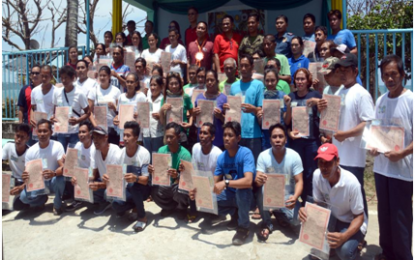
FROM LAND TILLERS TO LANDOWNERS. Department of Agrarian Reform (DAR)-Calabarzon Regional Director Rene Colocar (standing center, 3rd row with lei) joins some 50 former coconut farmers who are now land owners as they flashed their Certificates of Land Ownership Award (CLOAs) during the simple distribution rite in San Francisco, Quezon on Wednesday (Aug. 14, 2019). Each farmer received a CLOA from the 120.5 hectares of land from the properties of the Matias clan--Mario, Michael and Moises-- in Barangays Silongin and Casay in the town. (Photo courtesy of DAR-PAMRS)
SAN FRANCISCO, Quezon – Around 50 former coconut farm workers of private lands in the southern tip of Quezon’s Bondoc Peninsula coastal town now have their own lands, a Department of Agrarian Reform (DAR) official said Friday.
DAR-Calabarzon Regional Director Rene Colocar told Philippine News Agency (PNA) that the former coco farmers are now agrarian reform beneficiaries under the Comprehensive Agrarian Reform Program extension with reform (CARPer).
He said the 50 farmer-beneficiaries each received on Wednesday their respective Certificates of Land Ownership Award (CLOA) from the 120.5 hectares of land from the properties of the Matias clan--Mario, Michael and Moises-- in Barangays Silongin and Casay in this town.
“As owners of the land, farmers will be freed from the burden of paying rentals for the use of the land and from fear of getting ejected as tenants,” Colocar said.
He also assured the new landowners that the government’s support for them under the CARPer does not end in the distribution of lands, as there are also various support services to uplift their lives.
“The DAR, Department of Agriculture, the Land Bank of the Philippines and other CARP-implementing agencies coordinate with each other to ensure that program beneficiaries will have a better life after receiving their land titles,” Colocar added.
He also reminded the farmer-beneficiaries that “now that you own the land, be responsible and make it productive and progressive, as we at the DAR will provide you with support services to help you achieve this.” (PNA)
